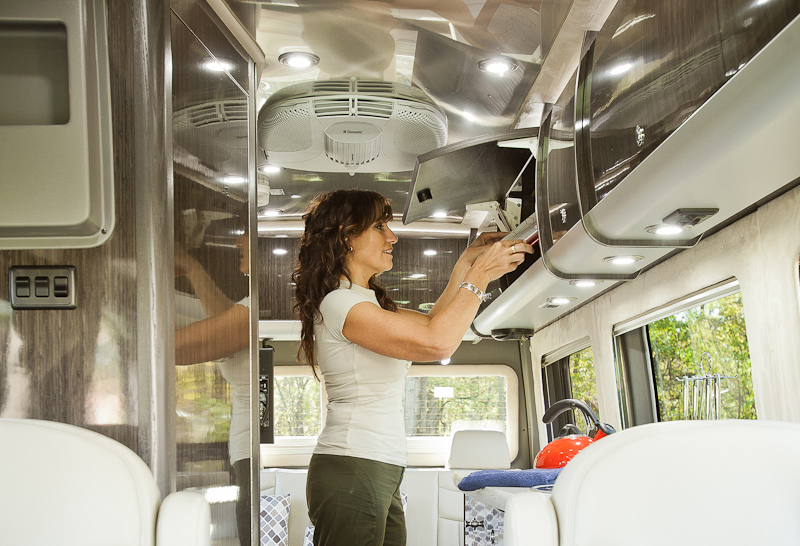Reduce the weight and clutter of your recreation vehicle by following these suggestions.
When it comes to packing the RV for upcoming travels, whether it’s for six days or six months, it’s important to make a packing list and check off items as they are gathered and stored in the RV. Each item should be considered for its usefulness and necessity, because our RVs have limited space – even the big ones. That space is filled in a hurry, especially if your time in the RV is of a longer duration or you’re a full-timer.
There are so many things you need to remember to bring, but there are also things you don’t need to take along because they aren’t necessary, useful, or you can manage as you go.
- Don’t stock the kitchen with bulk foods. It’s tempting, and it makes sense: If you buy in bulk and plan to be on the road or at a campsite for a longer period of time, you can skip trips to the store by having what you need on hand. But canned food gets heavy and takes up a lot of space. Have some things on hand to grab at a moment’s notice but it’s a better technique to plan your meals a few days at a time – and shop for those things just before they’re needed. This ensures that food won’t be left for long in your cupboard or pantry and it will save you some weight.
- Don’t outfit (everything) with storage enhancers. There are storage enhancers galore for any RV available on the market. They’re not all necessary though. If you find you need a little more space here and there, that’s reasonable, but don’t think that every cabinet, drawer, and cubby needs to be outfitted for maximum storage ability. This just encourages over packing, which adds more clutter and more weight.
- Don’t bring appliances and kitchen tools that are one dimensional. Bring appliances that have multiple functions and capabilities to maximize your cabinet and counter space. A toaster oven, for example, can act as a toaster and as a miniature oven for warming up food or cooking up sandwiches. Fancy gadgets or tools aren’t necessary in an RV, and having three of one type of utensil isn’t needed either. So save the space.
- Don’t bring every form of entertainment. Tablets, computers, DVDs, board games… these are all great to have along on a camping trip but you probably don’t need everything. For instance, board games – bring just your absolute favorites, not the whole stack. Use a Netflix account instead of bringing all the DVDs along. If you don’t need to work on the road, a tablet may be all you need, not the full laptop. Too many things or the wrong things can be distracting. Part of the RV lifestyle is to spend time with the people you’re with. So it’s fine to have things to entertain you along the way, but don’t forget about your relationships.
- Don’t think everything from home will work in your RV. The toilet plunger for instance. RV toilets are designed as a straight pipe system rather than have an S curve, like toilets at home. Plungers are meant to help remove clogs from that S curve. But you don’t have that in an RV. A home plunger can make clogs worse. Though there are RVers who would probably tell you otherwise, it’s better to be safe and have a plunger that is designed for an RV septic system – and any problems that may occur. Of course, this depends on what kind of toilet you have in your RV also.
- Don’t fill precious space with linens. Take a look at your linen closet at home and think of all the linens you don’t use regularly – and how much space it all takes up. Why would you do the same in your RV? Bring a few extras, like pillow cases and a couple sheet sets, but for the most part, clean the bedding that’s already on beds at a laundry mat and put them back on.
- Don’t bring firewood. Not only does it add a lot of weight and take up a lot of space, many states – Michigan included – have a Don’t Move Firewood campaign. Pests – (usually invasive) and plant diseases such as oak wilt spread this way and can destroy a beautiful area very quickly. It’s best to purchase firewood at the campground you’re staying.
At the end of a trip or the end of the season, as you unload, take a look at the items and contents that weren’t used. You probably won’t need it next time. For full timers, anything that hasn’t been used or used minimally for a year should be taken out.

